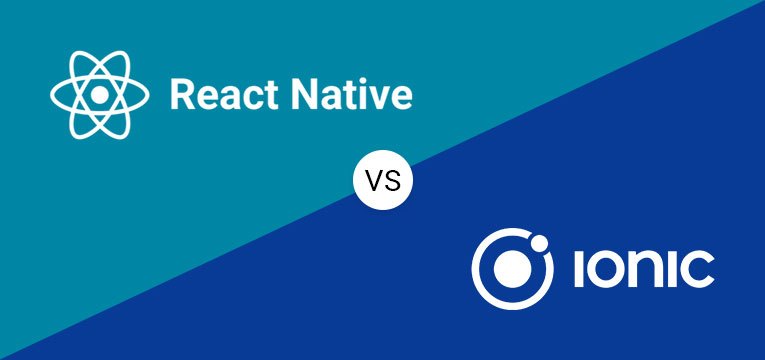Table of Content
- Let’s Get Started with React Native and Ionic
- What is React Native?
- What is Ionic?
- React Native vs Ionic: How are they similar?
- What is Ionic React?
- React Native vs Ionic: Head to Head Comparison
- React Native vs Ionic: Tabular Comparison
- 10 Most Popular React Native Apps and Ionic Apps
- React Native vs. Ionic: Which of these frameworks is the best and why?
React Native Vs Ionic: Which is the Best framework for App Development
In today’s digital era, every business wants to have a progressive application. If you are the one and if you want to have it quickly and cheaply, the best option is to hire Mobile App Developers that can work on cross-platform frameworks like React Native or Ionic. And these are the frameworks that enable the app developers to target the top mobile operating platforms like Android and iOS with the same codebase. This basically helps in saving a lot of money or time. Besides, both the frameworks can offer amazing native apps that are robust and user-friendly.
To know more about both these frameworks, their similarities, differences, and more, let’s go through this blog, and compare Ionic vs. React Native.
1. Let’s Get Acquainted with the Top Players – React Native and Ionic
With more and more companies acknowledging the dominance of mobile apps, they are compelled to seek different ways to provide their customers with the convenience of using their services in one go. So what needs to be done is wise decisions must be taken right from the scratch. For example, choosing the right platform to build mobile apps and before that, it’s better to consult a reputable Ionic or React Native development company
2. What is React Native?
React Native is an open-source framework that helps app developers to build mobile applications for iOS and Android platforms with the use of JavaScript. Besides, the developers can also implement features with the help of native code. React Native enables the developers to create a cross-platform application by offering platform-agnostic native ui components. And these native components can easily get mapped into the native UI building blocks of the platform.
Besides, since its emergence in 2015 by Facebook, React Native is used in many of Facebook’s products. In addition to this, React Native developers can create TV applications for both Apple and Android OS.

1. React Native Development Pros
Faster Development Process– We humans always strive towards “more for less” concepts and CEOs, or entrepreneurs are no exception. React Native development is all about using both iOS and Android platforms with the same code to deploy. As a result, the development cycle is shortened and the team is quite scaled up, saving an ample amount of time and money. Almost 50% of the development efforts can be cut without sacrificing the quality which also makes React native application development cost-effective.
Developers are easy to find – With the ever-increasing react-native community, finding reliable React Native developers is no big deal. With more and more development companies making the leap and switching towards tech, the more people work on it – the better it gets.
React Native development companies in India as well as across the globe will keep on increasing in the upcoming years as there is a sudden shift towards Hybrid and native mobile apps for the better.
Cross-platform mobile development – Increasing popularity cannot be ignored at any rate. With the emergence of React Native development services; one doesn’t require Java, Swift, or Objective C to develop iOS and Android apps respectively. Also, much like Ionic, this tech has strong and continuous support from a huge community of React Native developers. In case, if any problem arises, a JavaScript and native web developer is happy to help to fix them as well as share additional knowledge if possible.
Speed – The digital realm seems to be growing at a lightning speed and so do we. It may quite interest you to know that a small delay in the time to market entry could lead you to a huge failure. The need for implementing ideas before others is what needs to be done right away. The game is getting bigger & bitter. While chasing the two rabbits (iOS and Android) you might be left empty-handed. In simple words, the time taken to build two different apps would cost you more than building one in React Native. From what we observed, companies that emerged as top players in the game of mobile apps were the ones that had websites already built in the tech. After all, transiting from websites built-in React to a React Native app is much easier and faster.
App performs like a native app – It may quite interest you to know that building blocks of React Native can be compiled to native platforms as they are reusable native components. Yes, this means time to bid adieu to WebView system components. Also, with all the relevant look, speed, and functionality, the app performs just like a native app.
2. React Native Cons
- It may be disappointing for you to know React Native is still in its Beta version. No matter how many package compatibility or debugging tools are found, more time is spent on troubleshooting.
- It is not a fully cross-platform, single-codebase approach.
3. What is Ionic?
Ionic is a popular open-source Native API and UI framework that enables developers to create Android, iOS, web apps, and Electron. Besides, it offers native APIs and cross-platform UI components that can be used for developing amazing cross platform mobile apps. The very first version of this framework was released in the year 2013 and the recent version of Ionic is 6.0.0 which was released in December 2021. Besides, Ionic is a framework that enables developers to create hybrid mobile apps with the use of React.js, Angular, Vuejs, and more.
1. Ionic development Pros
Open Source – One of the obvious reasons behind the growing popularity of Ionic app development is that it’s completely available for free. From non-techie entrepreneurs to web developers; technology levels the playing field for all as anybody can create things easily.
So open source is great but at the same time does it offer stability? Remember this is no ordinary technology we are referring to, Ionic/Angular/React Native Development platforms incorporate a lot of investments and are more likely to go belly up than an enterprise-focused company charging huge bucks.
Performance-based – Since the day of its arrival, slowly and steadily the tech has changed in regards to performance. With the changing versions from Ionic to Ionic 3, Ionic 4, everything improved, especially those which skilled Ionic web developers never wanted in the hybrid app technology. Irrespective of the mobile device’s brand, it is now possible to operate apps in a faster and smoother manner.
Ease of Learning – Mainly considered as an easy-to-learn tool; more and more front-end developers are able to grasp the basics and choose between different web frameworks supported by Ionic.
Active and Supportive Community – Starting with a new framework is not an easy venture, especially for non-techies. Believe it or not, there are times when experts are unable to spot where the issue lies and how to deal with it. Ionic has a huge and active community ready to answer all your queries via blog posts or forums being answered by experienced members.
The best part is, you never know, you might be lucky enough to get your answers from the masterminds of the technology.
Concise Documentation – Most of the documents are used by those who have any queries regarding the platform. What is documentation, you may ask? Well, here the term means a comprehensive guide incorporating every useful topic regarding the technology such as what the components of Ionic are, how they must be used, do they interrelate, etc.
Other instruction steps like configuration guides and launching guides are also available.
2. Ionic development Cons
- Security issues – This shouldn’t be considered a con but a possible pitfall that can be faced by Ionic developers working on it.
- You may encounter a lack in regards to suitability, especially during the times of measuring the performance of heavy applications.
4. React Native vs Ionic: How are they similar?
When it comes to checking out the similarity between the two most popular web technologies, React Native and Ionic, one can say that both of them are very similar to each other. React Native is a framework that enables developers to build native apps with the use of JavaScript. And on the other hand, Ionic is a framework that creates mobile apps, web apps, and desktop apps with the use of technologies like HTML, CSS, and JavaScript. This clearly means that any developer who wants to work with these two technologies won’t have to have the knowledge of native iOS or Android development.
5. What is Ionic React?
Since we have done so much talking about React Native and Ionic, how can we forget to discuss Ionic React? Well, to be precise, it is an open-source UI mainly used to build iOS, Android, and Progressive Web Apps. This is a native API project that comprises cross-platform UI components and native functionality.
Technically speaking, since Ionic React is a blend of two frameworks, developers only need to write a single shared codebase to function across cross-platforms. Now if your development teams are comprised of traditional web development skills and libraries and aim to target mobile and web as a progressive web app, we are pretty sure that Ionic React is more likely to be a better fit here. And maybe that’s the sole reason why Ionic has been successful among startups and enterprises.
Ionic React is the official React Version of the Ionic framework. And it may quite interest you to know that Ionic React is used by some well known companies such as T-Mobile, America’s Test Kitchen, Schneider, Medical Answering Service, Yara International, IBM, and more. You see the blended framework can work such wonders.
6. React Native vs Ionic: Head to Head Comparison
1. Architecture
React Native is a framework that enables developers to develop apps with the use of JavaScript and React. And its underlying widgets are all Android components and native iOS. But it’s not actually a native app because React Native is a native framework that requires JavaScript to bridge the gap between the compiles of JavaScript & React code and native components. Basically, React Native is an abstraction that helps in controlling the UI modules of the platform directly. controls the platform’s UI modules directly. And as all the UI components in React are native to the platform, the applications created using it look similar to the native app.
On the other hand, Ionic is a framework that basically takes HTML, CSS, and JavaScript code and later on renders a full-screen web browser native component known as WebView to create mobile applications. Ionic codebase comes with WebView during the runtime with technology like Capacitor or Cordova. To make it simpler the Ionic app is a mobile-based website that is rendered onto a mobile application.
This is how architecturally different React Native and Ionic are.
2. Platform Adaptability
React Native is a technology that doesn’t allow developers to ignore the frameworks and platform-specific logic. And because native app development requires more work, React Native is developed to make the creation of native applications easier. Besides, the majority of the components in React Native are platform-specific logical equivalents, this means that this framework doesn’t take much effort to adapt features from a different platform.
On the other hand, Ionic takes the concept of Hybrid apps into consideration as in this type of application the same code is run and it appears similar, irrespective of the type of the platform. Besides, Ionic can easily adjust features to create a cross-platform app development process smoother. And this means that a developer can write an application once and run it anywhere with minimal changes.
3. Performance
React Native is a framework that delivers an experience that is similar to native and every app developer is generally obsessed with that, which is why they choose React Native over Ionic. And this is because the aim of React Native is to offer a closer native appearance and if the developer wants to modify some platform-specific components, React Native makes it possible. Basically, React is a perfectly stable framework that helps in creating large-scale applications. And it is a framework that is intended to offer responsiveness and great native performance.
On the other side, Ionic is known as a framework that focuses all on native browser applications and it is with help of mobile-optimized components like HTML, CSS, and JavaScript. It provides app development with a hybrid approach and this makes it perfect for rapid prototyping. Besides this, Ionic accomplishes modern requirements in such a way that it reflects the concept of writing once, running anywhere.
4. Technology stack
React Native, a JavaScript written framework is very popular in the app development world. All the UI pieces in this framework are written in JSX and not in HTML. Besides, JSX may just seem like any other template language but the huge difference is that it is powered by JavaScript. Besides, the main reason behind React Native using React is that both of these frameworks were developed by Facebook and both of them are open-source tools.
On the other hand, Ionic comes with a lot more flexible tech stack in comparison to React Native. The latest version of Ionic, version 4 can be used with any web development framework.
5. Testing
In React Native, testing can be done from the unit testing level to the automation testing level and this is by using frameworks like Jest, ReactTestUtils, and Jasmine for Unit testing. While for integration testing Mocha is used and XC Test is used for automating testing iOS UI Automation & iOS applications by using EarlGrey.
On the other hand, Ionic is a framework that reacts when an application is created with the use of Ionic CLI. Besides, it is automatically set up for integration and unit testing with React and Jest Testing Library.
6. Community Support
When it comes to choosing a framework for your next mobile app development project the first thing to evaluate is the team behind the technology. The reason behind it is the community of the technology that comes with amazing updates, solutions, and documentation to help the developers. Besides, React Native comes with 78k stars on GitHub.
On the other hand, Ionic is a framework that has around 38k stars on GitHub. And it has almost less than one-fifth of the React Native contributors.
7. Learning Curve
The learning curve is very essential for any developer. So if you are a React developer, learning React Native is very easy and simple for you. And the main reason behind it is that the concept between React and React Native are the same. Besides, the code is in React. The only difference one can see is the usage of web components in React and React Native. And because of all these things, any React developer can easily learn how to work with React Native. Besides this, when it comes to learning React Native, one has to first learn both React and JavaScript technologies. Besides, one has to start thinking like a mobile app developer and this is because the React Native application will work on both web and mobile. Basically, the learning curve without the knowledge of React can be a bit difficult.
On the other hand, Ionic is a framework that comes with a flexible tech stack which we have already seen in the above points. For this framework, any app developer has to use technologies like HTML, CSS, and JavaScript. This could be in addition to the web framework of your choice. And these web frameworks can be from React, Angular, Vue, Knockout, or more. This clearly means that when a developer starts using the Ionic framework, he can also pick another framework to work on for creating applications. Basically, the learning curve in Ionic is not more than in React Native. As with Ionic, a developer has to essentially create a web application that can later be turned into a mobile application.
More Resources:
7. React Native vs. Ionic — Tabular Comparison
| Capabilities | React Native | Ionic |
|---|---|---|
| Technology Stack | With an objective to learn once and write anywhere, React Native code is set to give a seamless native experience. | Ionic assists in building multi-functional and platform web apps. All this is done with a minimum code base. |
| Performance | With the use of a functional user interface, it provides a closer native appearance | By using web technologies for improved portability, this one offers a hybrid approach and accomplishes all the modern needs in such a manner. |
| Language Stack | React and JavaScript | All web technologies – HTML, CSS, JavaScript, Angular, TypeScript |
| Apps Created | Cross-platform | Hybrid apps |
| Learning Curve | Steep learning curve – Loved by React Developers | The easy yet monotonous learning curve |
| Well-known for | Native-like and elegant user interfaces across the platforms | Using a single code base you can develop an app for iOS, Android, Windows, Web, Desktop, and also PWA (Progressive Web Apps) |
| Platforms | Android, iOS, UWP | Android, iOS, UWP (Universal Windows Platform), and PWA |
| Top Companies using the Technology | Facebook, Instagram, Uber EATS, Airbnb | JustWatch, Untappd, Cryptochange, Nationwide, Pacifica, and many more |
8. 10 Most Popular React Native Apps and Ionic Apps
- Sworkit – Are you looking for a cross-platform app that uses the Ionic framework? Sworkit is the name to keep in mind that runs on both iOS and Android platforms. The web app technology enables a web developer to use a single codebase just to make it compatible enough on multiple platforms.
- McDonald’s Türkiye – Who hasn’t tasted yummy McDonald’s here? I am sure we all did and still keep on craving for more. Apart from being the world’s largest food chain, McDonald’s puts a lot of effort and resources into building a solid digital presence worldwide. No two ways about it! That’s why they decided to go with Ionic for their food ordering app in Turkey. In addition, the app provides you with lots of deals and discounts.
- Market Watch – Here we are presenting the Market watch app. Much like the Facebook app, this one shows the most current company news, stock market quotes, financial advice, and market data. Being an Ionic app, it works at its best on both Android and iOS web apps.
- Diesel – Even the Diesel brand has its own Ionic app, can you imagine? What the Ionic native application does is, helps the merchandising team create reports and analyze each store and product. The app also enables the company to come up with better ideas or ways to present themselves.
- StockPlan Connect – Even more complicated apps can be built with Ionic. The StockPlan Connect app is targeting Morgan Stanley stock plan participants. It helps the users view their balance, sell shares and make forecasts for their future stock performance.
- Facebook – Facebook is quite a known social network found today and I don’t need to mention how popular its mobile application is. Now there was one issue, the mobile development technologies were not ready for cross-platform back in 2010, especially not for Facebook’s requirements. So, naturally, the original app was slow, and buggy. As a result, they were looking for creating a new framework that meets the need and requirements. Hence they didn’t choose React Native but it was born with it.
- Instagram – It may quite interest you to know that Instagram registered 25000 users on the first day and within a week it already had 100.000 downloads. By April 2012, when Facebook bought Instagram, the mobile app already had 27 million users. So without any doubt, React Native made Instagram’s life so much better. And the cherry on top, thanks to React Native, Instagram has now an almost instantaneous start-up time. Today, Instagram has over one billion Google Play downloads and ranks #2 in Photos and Video apps on the App Store.
- Skype – Another known react native application is Skype. The Microsoft-owned platform connects thousands of people and teams around the world every single day. Now, why did they choose React Native here? The answer is performance and simplicity. Simply put, React Native is easier to learn and minimizes the tweaking needed to make both the iOS and Android versions of the app work.
- Uber Eats – This one is pretty known and popular. Today, Uber Eats operates in more than 6000 cities in 45 countries and has become the go-to service for delivery for most. After they choose React Native, today, UberEats ranks #2 in Food and Drinks on App Store and has been downloaded by more than 100 million Google Play users.
- Pinterest – Pinterest has stated that 2 billion searches every month, out of which 600 million are visual. React Native plays a pretty crucial role here. It’s the ability for code sharing resulting in minimized development work, performance, and scalability.
9. React Native vs. Ionic: Which of these frameworks is the best and why?
Honestly speaking both Ionic and React Native development technology are meant for the same purpose the only difference lies between them is in their project requirements. So, in short, everything depends on what you need for your business to grow. If you want to access native features then you should pick react native. Also, If you are considering performance, responsiveness, and a native app – choose React Native. In case, if you are considering low time and budget, and high-end support of native browser apps then without a shadow of a doubt choose Ionic.
Choose React Native, if
- You have a running React Native based website
- You have the best team of React developers at your service
- You believe the fact that Native platform dependency is crucial
- You have both time and money to develop cross-platform web apps
Choose Ionic, if
- You wish to build apps with an innovative idea, whether its eCommerce apps or native application
- The growth of your business is proportionate to MVP development of the Ionic apps
- The time factor is extremely critical and your competitors are seeking both these frameworks
- The budget is pretty much low and you want to get the best out of it.
Hope you clearly understand the difference between React Native vs Ionic. For further information and updates feel free to contact a leading React Native development company in India like us who ensures to offer you nothing but the best possible outcome.
Incorporated with numerous built-in web development functionalities, PHP frameworks have been evolving as the scripting language of choice in India as well as across the...
 Sep 23, 2020
Sep 23, 2020 



I must say it is a Blog with useful information on the internet! Thank you for sharing the advantages and drawbacks of React Native and Ionic framework.
Nice Article, It's interesting to read till the end with lots of information. Keep updating your blogs.Thank you so much for sharing.
Thank you for this very detailed comparison. What metric do you use to evaluate this, so I can use to make a decision between opting for Ionic which is much simpler or just going head on with React?